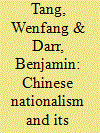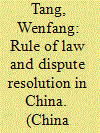|
|
|
Sort Order |
|
|
|
Items / Page
|
|
|
|
|
|
|
| Srl | Item |
| 1 |
ID:
114228


|
|
|
|
|
| Publication |
2012.
|
| Summary/Abstract |
Using the 2008 China Survey, this paper examines Chinese respondents' feelings toward their country and how such feelings are related to their democratic values. First, it compares Chinese nationalism with that of 35 countries and regions in the 2003 National Identity Survey. Second, it looks at the origins of Chinese nationalism as embedded in the social and political characteristics of individuals. Third, it further examines the impact of nationalism on people's political attitudes. The findings show that nationalism in contemporary China is better predicted by the political and economic characteristics of an individual rather than cultural attributes, and that nationalism serves as a powerful instrument in impeding public demand for democratic change.
|
|
|
|
|
|
|
|
|
|
|
|
|
|
|
|
| 2 |
ID:
085584


|
|
|
|
|
| Publication |
2008.
|
| Summary/Abstract |
Using data from a 2004 national survey, we examine the recent trends in the conditions of migrant workers in China. Our discussion engages the debate in the existing literature between the migrant workers as victims of China's economic growth and as a newly emerging political force with growing bargaining power. The study focuses on three dimensions of migrant workers' status: their socio-economic conditions, relations with rural and urban residents, and conflict resolution behaviour. The findings indicate that while migrant workers continue to occupy more blue-collar and service jobs than urban residents, their economic, social and political status has improved. In some areas, migrant workers show even more political activism than both rural and urban residents. Migrant workers' growing social influence is a positive development in China's political diversification.
|
|
|
|
|
|
|
|
|
|
|
|
|
|
|
|
| 3 |
ID:
192089


|
|
|
|
|
| Summary/Abstract |
Drawing data from a national survey, this study relies on several embedded list experiments to examine the grassroots bribery that the survey respondents tried to hide due to social desirability. The findings from the list experiments are extracted to develop an innovative weighting technique to provide accurate estimations of bribery behavior. It finds that the level of grassroots bribery in public sectors is significantly higher than what people would admit; that the reasons for bribery can be traced to the country’s public service distribution, the low risk of practicing bribery, and the rapid increase in disposable income. These findings suggest that grassroots bribery is still a serious issue in Chinese society, and it creates new challenges for effective governance during the country’s anti-corruption campaign.
|
|
|
|
|
|
|
|
|
|
|
|
|
|
|
|
| 4 |
ID:
182861


|
|
|
|
|
| Summary/Abstract |
How does ethnic identity affect political participation in China? The Chinese government gathers information and shapes public opinion through mass mobilization. These efforts include the managed mobilization of politically sensitive ethnic minorities. We draw on a dataset of the preferred political activities among 8,000 individuals in China, including more than 1,500 ethnic minority group members and find that politically sensitive minority groups rarely stay silent when faced with problems. Instead, they are more likely than the majority Han to participate and express grievances. However, ethnic minorities overwhelmingly prefer political participation by directly contacting the government, that is, through institutionalized and carefully managed channels. We show that populist authoritarian governments encourage political action by ethnic minorities through institutionalized channels while penalizing confrontational activities. As these minorities are integrated into Chinese society, measured by language proficiency, they tend to become politically more sophisticated in using nontraditional channels such as the internet and confrontation for problem solving.
|
|
|
|
|
|
|
|
|
|
|
|
|
|
|
|
| 5 |
ID:
065877


|
|
|
|
|
| Publication |
Stanford, Stanford University Press, 2005.
|
| Description |
xvii, 237p.
|
| Standard Number |
0804752206
|
|
|
|
|
|
|
|
|
|
|
|
Copies: C:1/I:0,R:0,Q:0
Circulation
| Accession# | Call# | Current Location | Status | Policy | Location |
| 050173 | 320.951090511/TAN 050173 | Main | On Shelf | General | |
|
|
|
|
| 6 |
ID:
088691


|
|
|
|
|
|
|
|